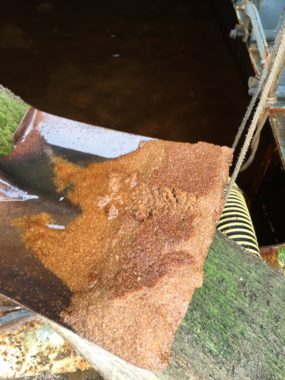Wrangell is in a water crisis. Between two fish processors and the public, demand is exceeding the water treatment system’s ability to produce clean water. The assembly and borough manager declared a local emergency disaster Tuesday and are asking the public to cut water consumption 30 to 50 percent.
Water Plant Manager Wayne McHolland said Wrangell’s treatment system was never designed for the community’s water source.
“It’s designed for spotlessly clean water going into it. We don’t have that, we never have. It has never worked since the beginning,” said McHolland.
The system was designed for ground water, which is dramatically cleaner than what’s supplied by Wrangell’s two reservoirs. McHolland said the surface water is too dirty and slows the treatment process.

“Regardless, it comes into the plant and we have inefficiencies in our roughing filter system. It goes through and then all this dirt ends up in the main filters, which clogs them extremely rapidly,” he said.
The public works department has been cleaning the filters every few days, costing the plant valuable production time. The filters are designed to last three months.
“Yea, it takes us about 200,000 gallons to do maintenance on a filter, from the initial loss of dumping a filter, which we can’t recover, which is the major loss,” said McHolland. “Then about another 50,000 to do the maintenance on it.”
The plant can produce up to 1.4 million gallons of water per day and can store about 850,000 gallons at a time. The plant had about 40 percent of that capacity Wednesday morning.
The assembly unanimously voted to declare a local emergency disaster to tap into state resources as well as bypassing procurement codes. Bypassing the codes will allow Borough Manager Jeff Jabusch to quickly pursue any solutions to the crisis.
The borough is moving forward on modifying the system’s filters in hopes of speeding up production. It expects to spend $25,000 on that modification. Plant Manager McHolland is unsure how much it will help speed up water treatment.
Public Works Director Amber Al-Haddad said Wrangell’s two seafood processors, Trident and Sea Level Seafoods, account for little over half of the demand.
Al-Haddad said both processors have been conserving water. But, both Trident and Sea Level say their production has been limited by the borough for about two weeks, costing thousands of dollars.
John Webby is a manager for Trident. He said it has cut water consumption in half and shut down for three days during the last two weeks. He said the plant has diverted about 1.5 million pounds of fish to other Trident locations.
“I cannot manage that plant the way we’re running right now, cannot do it. I can manage the plant with something, but I can’t manage it with nothing,” said Webby.
Webby asked the assembly to find a way to split available water between the two processors.
“I believe that whatever available water there is, whatever it is for the processors, that has to be determined by the council, water department or engineering, I think there should be a fair equitable divide in that water. Because that’s not what’s happening,” he said.
Al-Haddad said her department is looking into a way to evenly split water usage.
Vern Phillips manages Sea Level. He said it has modified the plant’s plumbing to use salt water, reducing its fresh-water intake by about 60 percent. Phillips said Sea Level doesn’t have another location to divert tenders to like Trident, causing the plant to throw out thousands of dollars in product.
“We cooked crab yesterday. Of what we had in the system, there was about 2,000 pounds of crab wasted. That in itself what about $6,600,” said Phillips.
The borough is testing a new type of water treatment later this month in hopes of solving the problem, which has plagued Wrangell for years. The pilot study was funded with grant money earlier this year.
Al-Haddad said if the treatment method proves successful, the department will seek funding to convert Wrangell’s plant. The assembly has added the conversion to the agenda at the next regular meeting July 26. The new system would add about a million gallons of storage capacity, and treat water faster.
The borough has created a webpage to update the public on the water crisis as well as a Q&A.